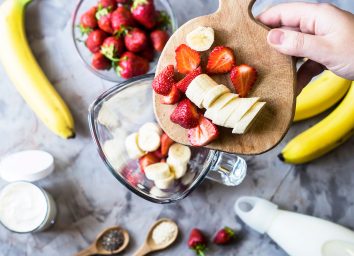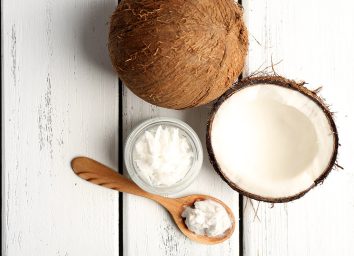20 Expert Guidelines for a Healthier Lifestyle
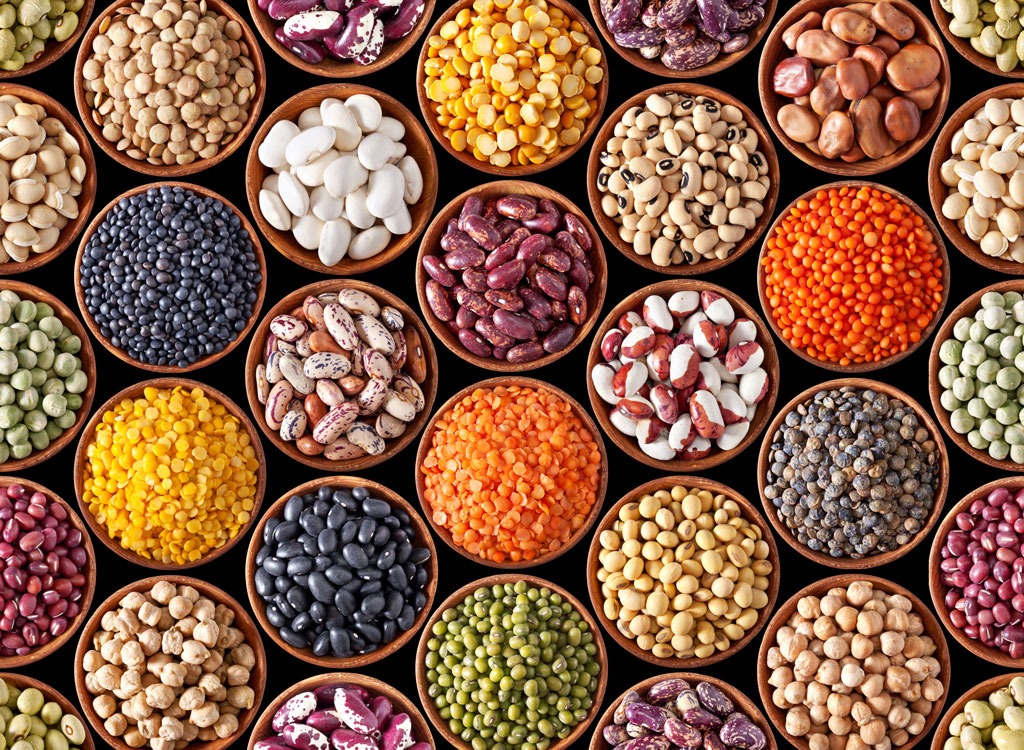
If you thought one pinch of salt was harmless, think again.
Hot bodies aside—sorry, flat abs and skinny jeans—health comes down to way more than just physical appearance. Keeping sodium intake under wraps, activity levels consistent, and whole grains on the up are all habits that contribute to better check-ups with your doc. Yes, more whole foods and greater exercise will point you in the direction of a healthier lifestyle. But do you really know what's what for it to make a difference? That's where the experts come in.
They've got the certifications, scientific research, and years of experience to boot—so it would be wise to heed these expert recommendations on how to lead a truly healthy life. Here's everything you need to know about everything you're supposed to be doing (or not doing) in one handy spot! Bookmark it (like, forever) and then keep the smart choices going by avoiding these 20 Sneaky Foods Pretending to Be Something They're Not.
Fats
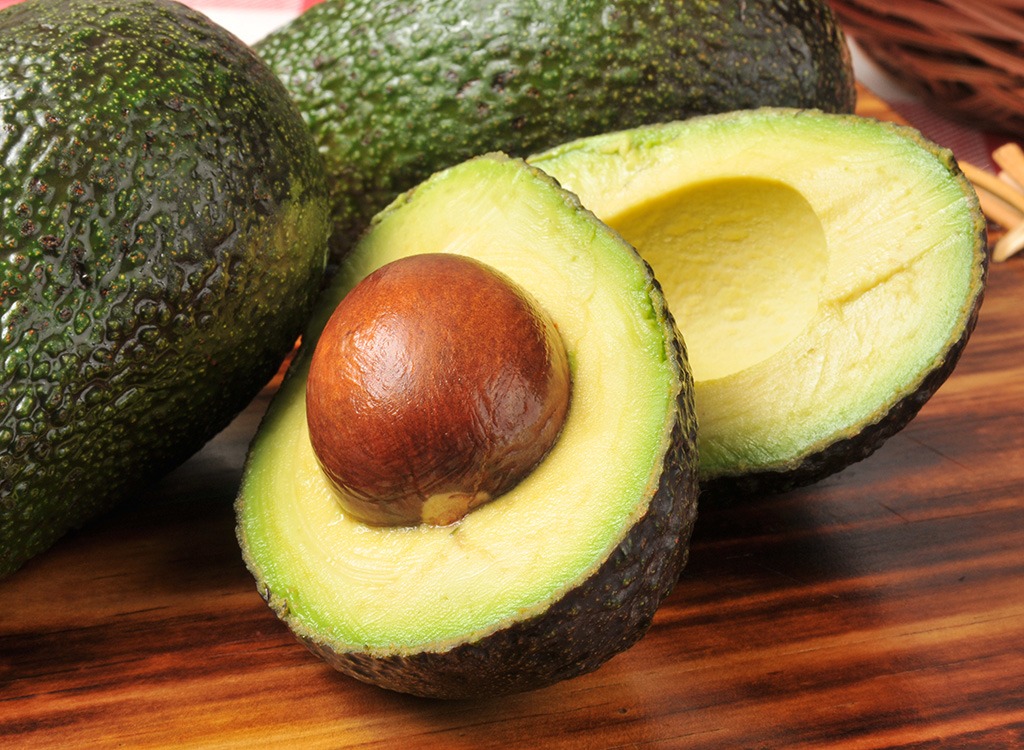
Not all fats are created equal. There are good fats, like monounsaturated and polyunsaturated, which can help reduce bad cholesterol levels and reduce your risk for heart disease and stroke. And then, there are bad fats, like saturated and trans fat, which can put you at greater risk for heart disease. The American Heart Association recommends limiting saturated fats to no more than 13 grams per day and replacing them with the good ones by eating foods like salmon and olive oil in moderation. For more on which fats are good for you, check out these 20 Healthy Fats to Make You Thin.
Protein
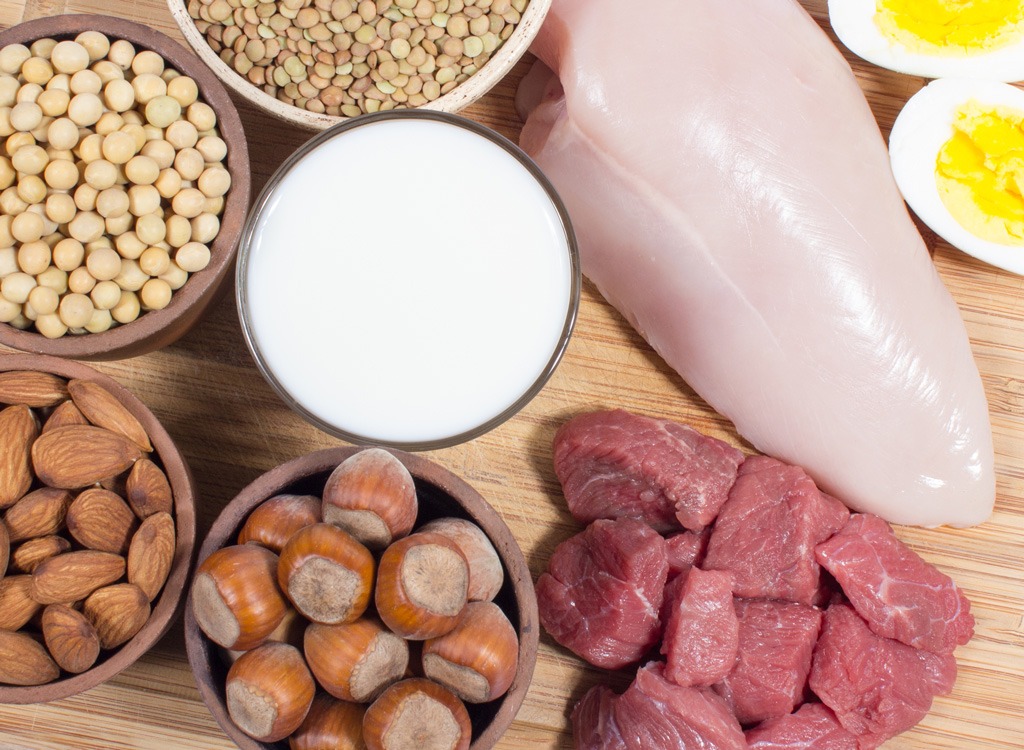
There is such a thing as too much protein, but chances are unless you're making a dedicated effort to get adequate amounts in your diet, you might not be getting enough. The Institute of Medicine suggests that men should aim for 56 grams per day and women around 46 grams. Think eggs and Greek yogurt in the morning, beans, quinoa, or lean protein in the afternoon, and lean meats and veggies at night. For everything you need to know about protein, don't miss our exclusive report, The Ultimate Protein Guide.
Sodium
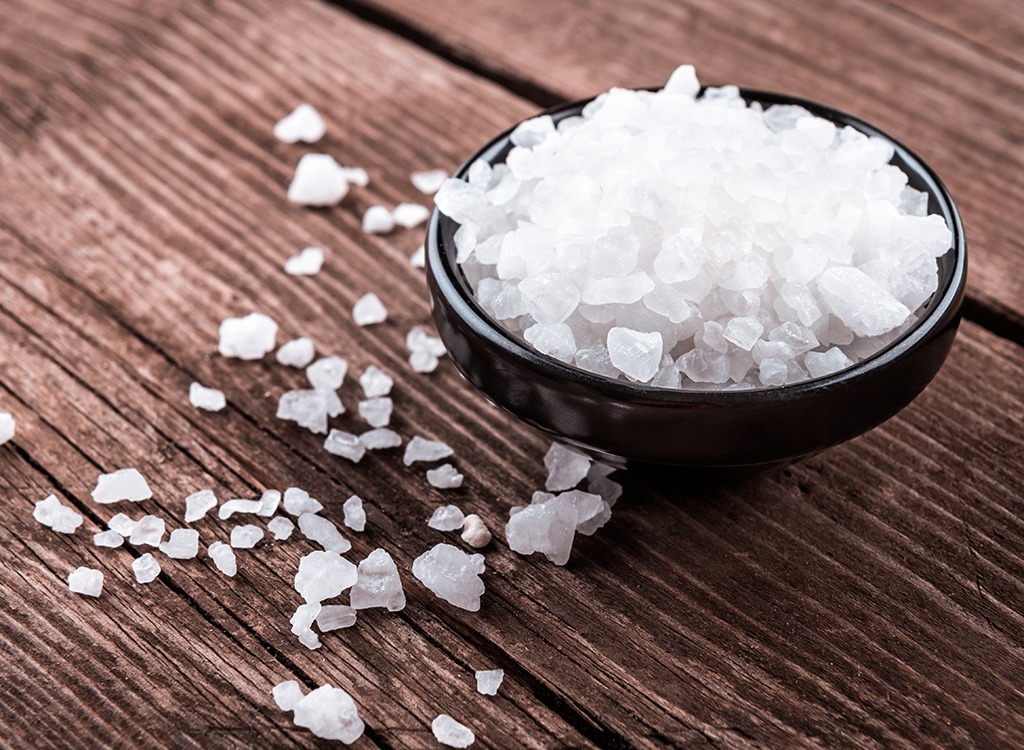
Just a teeny, tiny pinch of salt contains over 400 mg. When the daily recommended limit is 2,400 mg—according to the American Heart Association—one too many pinches can add up fast. Not to mention the majority of salt we consume on a regular basis doesn't even come from the shaker, but rather processed foods. Start scanning nutrition labels and replace your salt shaker with the spice rack. By reducing sodium intake you can lower your blood pressure and reduce your risk for cardiovascular disease.
Fiber
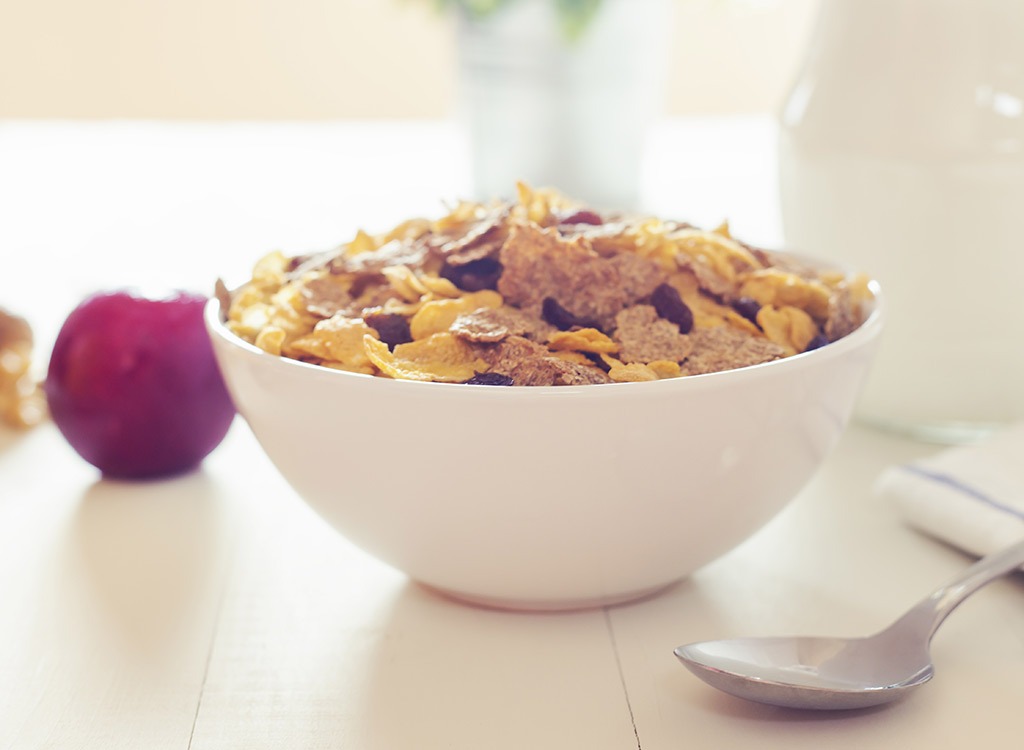
Fiber doesn't just come from boring, tasteless bran cereals, which means that getting more of it in your diet is easier than you think. The American Heart Association recommends getting about 25 grams of fiber per day for a 2,000 calorie diet, and also suggest turning to fiber-rich foods rather than supplements. Oatmeal, whole wheat bread, beans, and peas are excellent sources of dietary fiber and are just a few items on the list of 30 High Fiber Foods That Should Be In Your Diet.
Sugar

Sugar is quite simply the #1 enemy, and most of us really need to stop fraternizing with it. The AHA recommends limiting the amount of added sugars to no more than about 6 teaspoons per day. (The USDA announced a guideline of 45-50 grams per day, but that's still really high. We're sticking with 25!) Scanning labels is going to help tremendously with avoiding the nutritionless substance, so look out for all forms of it including things like sucrose (basically anything ending in "ose"), corn syrup, molasses, cane sugar, and fruit juice concentrates. Wondering about sweeteners? We've analyzed them all in Every Popular Added Sweetener—Ranked!
Carbs
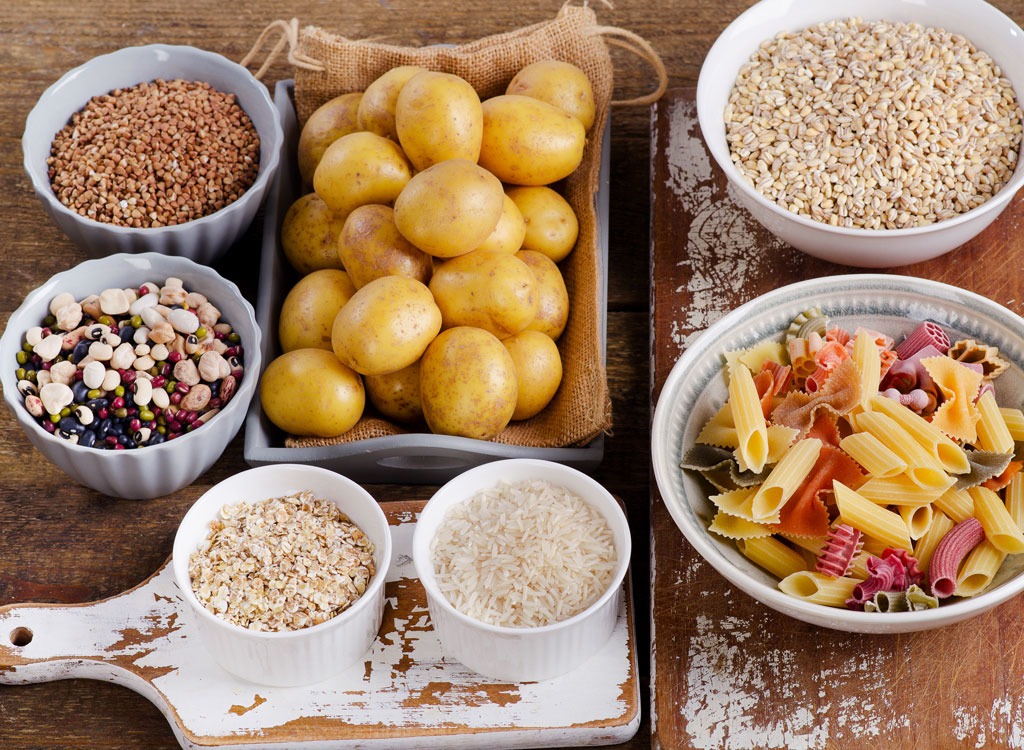
If there's one thing all health experts want you to stop doing, it's cutting out carbs. Carbohydrates are necessary for healthy body function because they are on of its main energy sources. The Dietary Guidelines for Americans recommends that carbs make up around 45 percent to 65 percent of your daily calorie totals, which comes to around 225-325 grams per day. This doesn't mean you should be eating white bread for breakfast, lunch, and dinner, however. It's still necessary to choose the right ones. Go for complex carbs like oatmeal, sweet potato, and brown rice. If you're worried about your waistline, just follow our tips in The Official Carb Lover's Guide to Weight Loss.
Water

Somewhere along the line, you were told to gulp down eight 8-ounce glasses of water per day—because What Happens When You Don't Drink Enough Water is no joke. The Institute of Medicine suggests that the average, healthy adult living in a temperate climate get about 3 liters of water per day for men and about 2.2 liters for women. However, depending on your activity levels, age, gender, diet and individual needs, that number may vary. A good way to monitor your hydration is to take a look after you pee. If your urine is a darker yellow, that's a sign you need more H20.
Fruits and Vegetables

Fit them in one way or another, because fruits and veggies provide your body with a wide array of necessary nutrients. The AHA recommends eating eight or more fruit and vegetable servings per day, which translates to about 4.5 cups of fruits and veggies for someone on a 2,000 calorie diet. Easy ways to sneak them in are by replacing low nutrition snacks like chips or candies with cut up fruit and veggie sticks. You have tons of great options here, but if you aren't sure where to start, we like these 15 Most Antioxidant-Packed Fruits & Veggies!
Alcohol

Consuming everything in moderation is a good rule to live by, but it's especially important when it comes to alcohol. If you don't drink, then it's best not to start. But if you're no stranger to a glass of wine at the end of a long day, then stick to one if you're a woman or two drinks max per day for men according to the AHA. Is it okay to have a few sips when pregnant or not? America's leading OB/GYN Jennifer Ashton, MD, recommends skipping alcohol—all of it—when pregnant. Find out more in her new book Eat This, Not That! When You're Expecting!
Sleep

No matter how much your coworker brags about running on less than six hours of sleep, he's still the one at a loss. There is no pride in sleepless nights because your body needs a certain amount of sleep to function at its best ability. The National Sleep Foundation advises that adults get 7-9 hours of restful sleep each night. This means shutting down phones and computers earlier and allowing your body some time to get into sleep mode. Finding alternative nighttime activities like reading or taking a bath can help you achieve those daily hours more easily and result in major health benefits like weight loss, increased energy, and immunity. For tips you can use tonight, find out The 7 Habits of Highly Rested People!
Cardio

When it comes to exercise, we all have our preferences and opinions on what's the best workout—SoulCycle diehards, we see you. But when it comes to matters of health, the most important thing is that you just get moving. The AHA suggests getting at least 150 minutes of moderate exercise per week or 75 minutes of vigorous exercise. If that sounds intimidating, just remember 30 minutes, five times a week.
Strength Training

As silly as it sounds, it really is important that you lift things up and put them down. The American College of Sports Medicine (ACSM) recommends that adults schedule in strength training sessions two non-consecutive days each week. If you're new to weights, consult a trainer on proper form, and remember that it's alright to start small, just so long as you start.
Stretching

When it comes to fitness routines, the focus tends to lie solely on fat burning and building muscle, pushing one of the most important aspects to the wayside: stretching. Not just a requirement for nimble-bodied dancers, all adults should be participating in stretching activities as least two days per week, according to the American College of Sports Medicine. If you have any kind of stiffness or restricted range of motion, they recommended taking the time to stretch daily. Stretching not only prevents injuries, but it helps your body recover better and perform at a higher capacity. Not to mention your body will just feel so much better on a daily basis—so long, stiff hamstrings!
Whole Grains
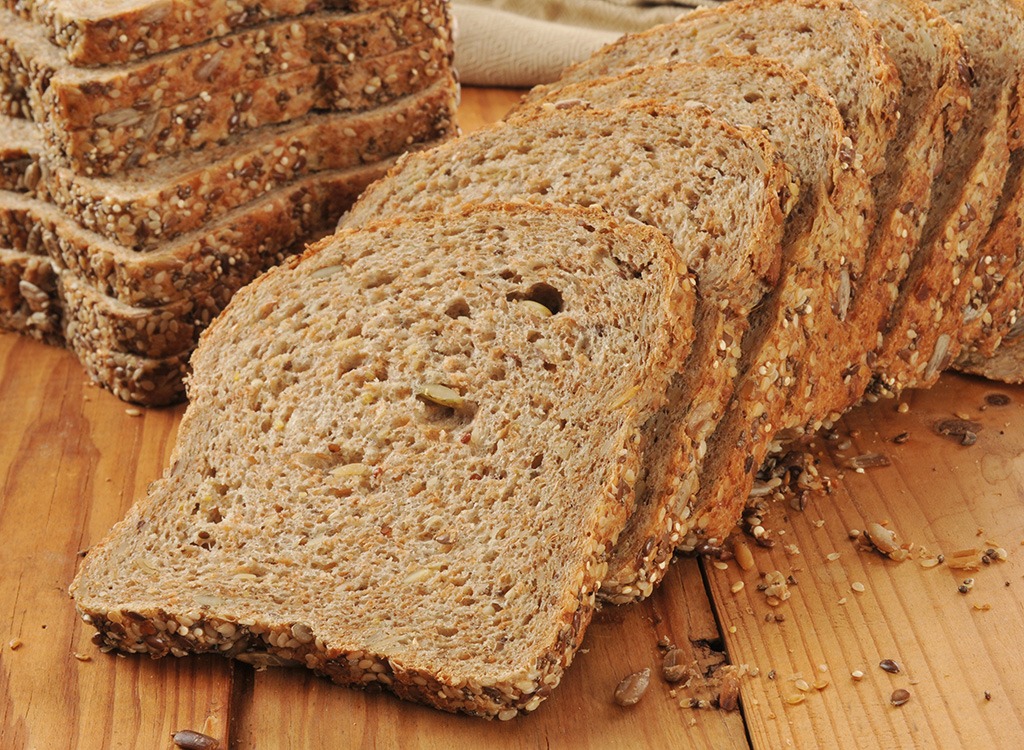
If it's not 100% whole grain, then it doesn't count as a serving. Not only does the average American get less than one serving of whole grains per day, but 40 percent of Americans don't eat any whole grains at all, according to the Whole Grain Council! The Dietary Guidelines for Americans recommend that adults get 3-5 servings of whole grains every day. This could mean two slices of certified whole grain toast in the morning, a quinoa salad in the afternoon, and a filling bowl of air-popped popcorn at night. We love these 30 Quinoa Recipes for Weight Loss and think you will, too!
Calcium

Think of your skeleton as your body's foundation. Without the strongest beams to support your structure, you aren't able to build the biggest, strongest form possible. The Food and Nutrition Board (FNB) at the Institute of Medicine of the National Academies suggest that adults get around 1,000-1,200 mg of calcium on average each day to maintain healthy muscle and nerve function and also promote strong bones and healthy teeth. Milk, yogurt, cheese, and kale (yes, kale!) are all great sources of the mineral. Don't believe us about the kale? Well, check out these 20 Best Calcium-Rich Foods That Aren't Dairy!
Iron

Not only do you have to pump iron at the gym, but you've got to make sure you're getting enough in your diet, too. Iron is important because it helps deliver oxygen to your muscles assisting in proper functioning and repair. The Food and Nutrition Information Center of the USDA recommends that men over the age of 19 shoot for 8 mg per day, women ages 19-50 reach for 18 mg per day and then 8 mg per day after the age of 51. While the richest sources of iron include lean meat and seafood, vegetarians can get their dose from nuts beans and fortified grain products like cereal.
Magnesium
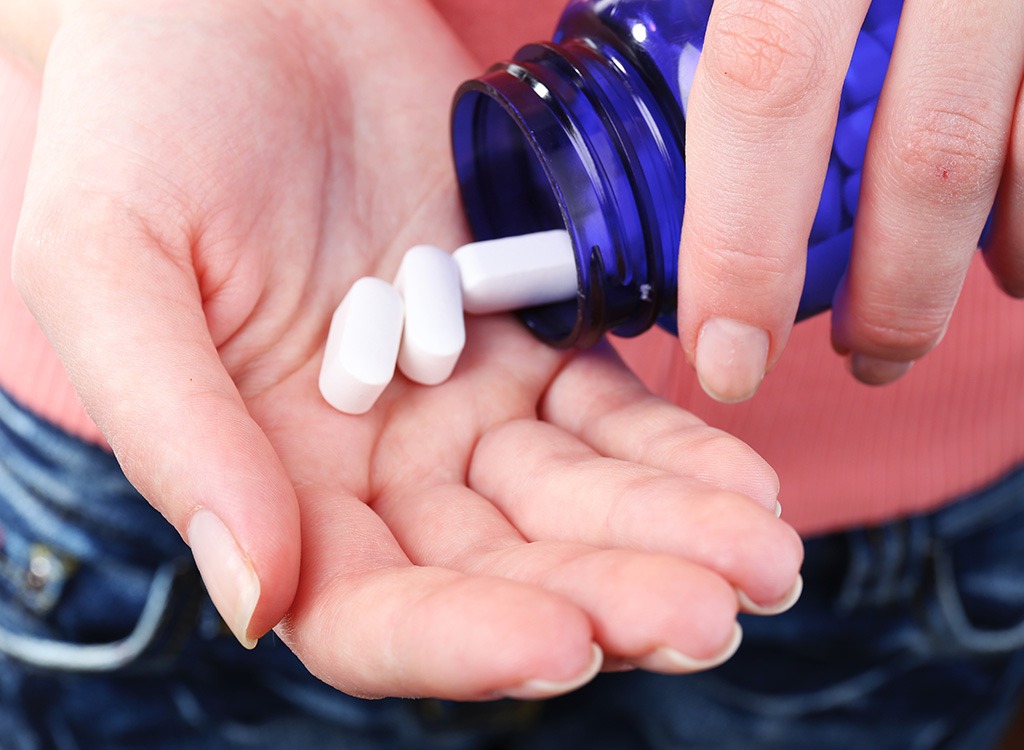
So many nutrients go into the making and functioning of our bodies—which is why it's so important to eat a wholesome and balanced diet filled with a variety of foods. One of those key nutrients is magnesium, which is important for protein synthesis in the body, proper muscle and nerve function, and energy production. The FNB at the Institute of Medicine suggests that men get 400-420 mg per day and women 310-320 mg. This translates roughly to about one heaping handful of almonds, 1.5 cups of spinach, and a tall glass of soymilk.
Vitamin C

We all know oranges are packed with Vitamin C, which is crucial for skin health and immunity. The FNB at the Institute of Medicine recommends that men get 90 mg of C per day and women need around 75 mg. Oranges may be the poster child for the vitamin, but red bell peppers are actually the real star when it comes to the vitamin's density, boasting 95 mg in just ½ cup serving.
Vitamin D

Vitamin D deficiencies are among the most common according to experts, which largely has to do with the fact that very few food sources contain the substantial amounts of the vitamin. Vitamin D works to help the body absorb more calcium from food, helps keep our bones strong and also helps reduce our risk for conditions like diabetes. (Psst! Vitamin D also reduces bloating!) The Institute of Medicine of the National Academies suggests adults need around 600 IU (international units) of vitamin D daily. To reach that amount, you'll need a little help from the sun, which is the single greatest source of the vitamin for most people. Just 5-10 minutes in the sunlight a couple times per week is enough to reach your daily requirements. However, it's important to then apply sunscreen after those ten minutes to protect against skin cancer.
B Vitamins
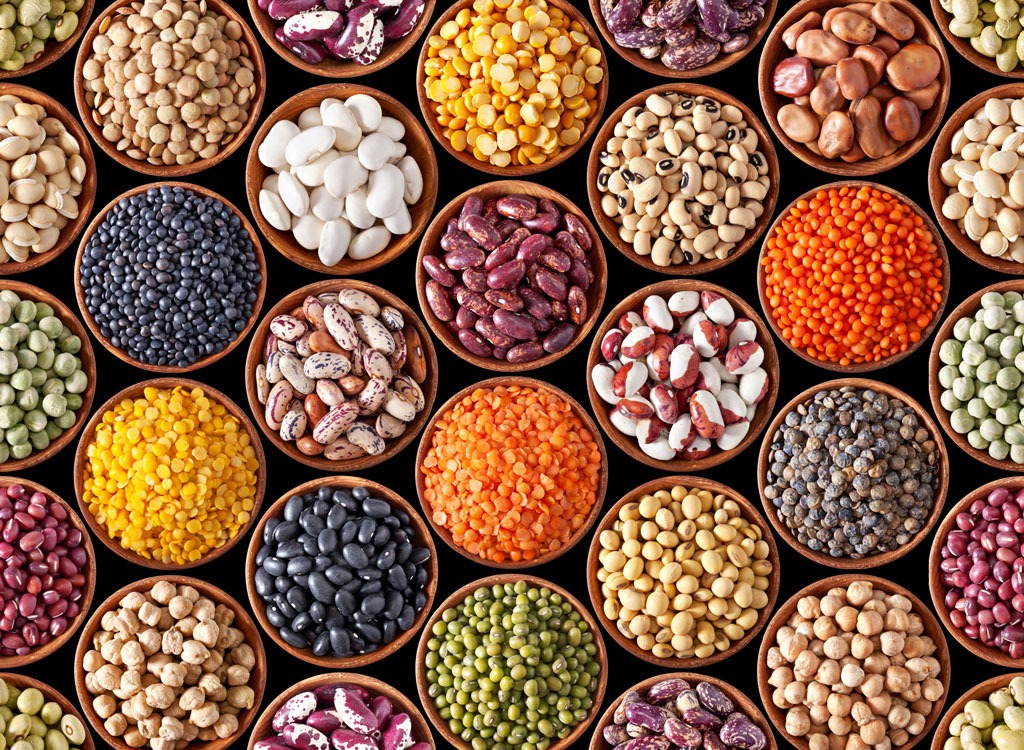
As a collective group, B vitamins are important for maintaining a healthy nervous system, and individual needs vary slightly within the category. For instance, The National Institute of Health recommends a daily serving of around 1.1 to 1.2 mg of vitamin B1 for adults, which helps your body break down carbs into sugars. The daily suggestion for vitamin B2 is slightly higher at 1.3 mg per day on average and is crucial because it helps your body turn carbs, fats, and protein into usable energy. Similar in purpose is vitamin B3, which we need about 14-16 mg per day of. The good news is B vitamins are found in abundance in green vegetables, nuts, legumes and fortified grains, dairy, and meats. Not only will this B group boost your energy and mood, but they also play a part in promoting a healthy metabolism. Speaking of, discover these 55 Best-Ever Ways to Boost Your Metabolism!

